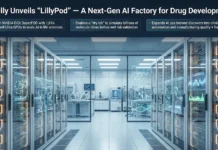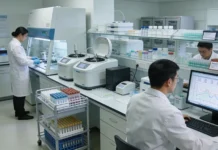Lonza is revolutionizing drug development with its AI-driven route scouting technology, allowing pharmaceutical companies to fast-track their investigational new drug (IND) submissions. By integrating artificial intelligence (AI) into their processes, Lonza has been able to significantly reduce the time it takes to design and optimize synthetic routes for drug substances, providing a more efficient and cost-effective pathway for clients.
The traditional approach to drug substance development, particularly for new chemical entities (NCEs), can be time-consuming and labor-intensive. The early stages of development often require extensive experimentation and optimization to identify a viable synthetic route for producing the active pharmaceutical ingredient (API). This process involves selecting the appropriate raw materials, reagents, and chemical reactions to synthesize the desired molecule while ensuring scalability, safety, and regulatory compliance.
Historically, this route scouting process could take several months or even years, as chemists and process engineers would need to explore multiple potential pathways, testing different conditions, and evaluating the outcomes. However, with AI-powered route scouting, Lonza has drastically shortened the timeline, reducing the time required to weeks rather than months.
Key Benefits of AI Route Scouting
- Efficiency and Speed: AI route scouting employs machine learning algorithms to analyze vast amounts of chemical data and predict the most efficient synthetic routes for a given drug substance. By simulating numerous potential reactions and conditions, the AI can identify optimal pathways that would be difficult or time-consuming for humans to discover manually. This approach accelerates the decision-making process and reduces the need for trial-and-error experimentation.
- Cost Reduction: The time savings associated with AI-driven route scouting translate directly into cost savings for pharmaceutical companies. By reducing the number of experiments and resources required to identify a viable synthetic route, companies can allocate their budgets more effectively and potentially bring new drugs to market faster.
- Enhanced Predictability: AI models can incorporate data from previous projects and use predictive analytics to assess the feasibility and scalability of different synthetic routes. This helps mitigate the risk of late-stage failures and ensures that the chosen route is robust enough to meet commercial manufacturing requirements.
- Improved Sustainability: AI route scouting can also contribute to more sustainable drug development by identifying greener and more efficient chemical processes. By selecting routes that minimize waste, energy consumption, and the use of hazardous reagents, Lonza is supporting the pharmaceutical industry’s efforts to reduce its environmental impact.
- Enhanced Collaboration and Knowledge Sharing: AI route scouting also fosters enhanced collaboration across teams by providing a centralized platform for sharing insights and data. Researchers can easily access AI-generated predictions, compare them with historical data, and collaborate with cross-functional teams to streamline decision-making processes. This shared knowledge not only accelerates the development timeline but also fosters innovation, as teams can build upon previous successes and avoid repeating past mistakes. By integrating AI, companies are able to create a more cohesive and collaborative research environment, driving collective progress in drug development.
Integration of AI with Human Expertise
While AI plays a crucial role in accelerating route scouting, human expertise remains essential in the decision-making process. Lonza’s team of chemists and process engineers work closely with the AI system, using their knowledge and experience to validate the AI’s recommendations and make informed choices about the best synthetic routes.
AI technology enhances the capabilities of human scientists by providing them with data-driven insights and recommendations, but it does not replace the need for expert judgment. Instead, it allows scientists to focus their efforts on refining and optimizing the selected route, rather than spending time on initial scouting.
This collaboration between AI and human expertise creates a synergistic approach to drug substance development, combining the speed and efficiency of AI with the creativity and problem-solving abilities of experienced chemists.
The Role of AI in IND Submission
For pharmaceutical companies aiming to submit an IND to regulatory authorities, time is of the essence. The IND submission process involves providing detailed information about the safety and efficacy of a new drug, including the synthetic route used to produce the API. Any delays in developing the synthetic route can push back the entire drug development timeline, delaying clinical trials and ultimately market entry.
By leveraging AI for route scouting, Lonza helps its clients accelerate this critical phase of development, allowing them to submit IND applications faster and with greater confidence. The AI-driven approach ensures that the synthetic route is well-optimized and scalable, reducing the risk of manufacturing issues that could arise during later stages of development.
Moreover, the AI system can assist in generating the necessary documentation and data required for IND submission, streamlining the regulatory approval process and reducing administrative burdens for pharmaceutical companies.
Future Outlook
As AI continues to evolve, its applications in pharmaceutical development are expected to expand even further. In addition to route scouting, AI has the potential to optimize other aspects of drug development, including formulation, clinical trial design, and even patient selection. Lonza is at the forefront of this technological revolution, continuously exploring new ways to integrate AI into its processes and improve outcomes for its clients.
The use of AI in drug substance development represents a significant step forward in the pharmaceutical industry’s ongoing quest for innovation. By combining cutting-edge technology with human expertise, Lonza is helping to reshape the future of drug development, making it faster, more efficient, and more sustainable.
In conclusion, Lonza’s AI-driven route scouting technology is transforming the way pharmaceutical companies approach drug substance development. By accelerating the identification of optimal synthetic routes, reducing costs, and improving predictability, Lonza is enabling its clients to bring new drugs to market more quickly and efficiently. As AI continues to advance, its role in the pharmaceutical industry is likely to expand, offering even greater opportunities for innovation and success.



















